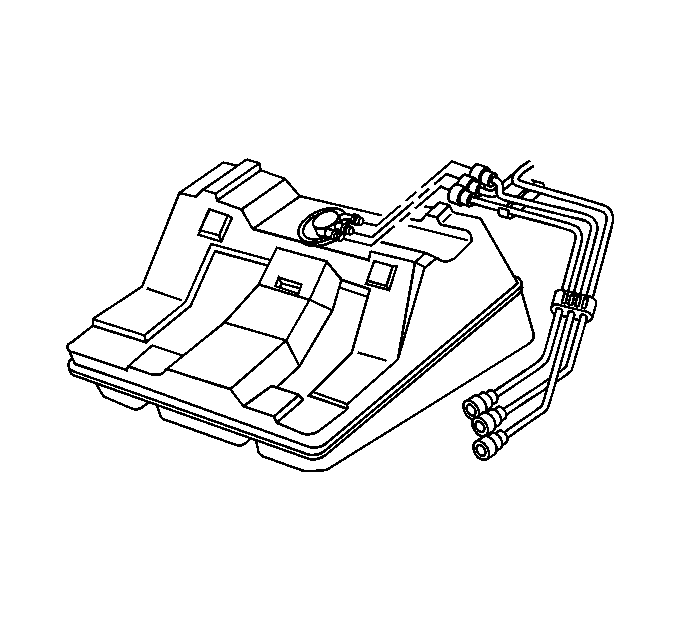Removal Procedure
Caution: In order to Reduce the Risk of Fire and Personal Injury:
• If nylon fuel pipes are nicked, scratched or damaged during installation,
Do Not attempt to repair the sections of the nylon fuel pipes. Replace them. • When installing new fuel pipes, Do Not hammer directly on the
fuel harness body clips as it may damage the nylon pipes resulting in a possible
fuel leak. • Always cover nylon vapor pipes with a wet towel before using a
torch near them. Also, never expose the vehicle to temperatures higher than
115°C (239°F) for more than one hour, or more than 90°C (194°F)
for any extended period. • Before connecting fuel pipe fittings, always apply a few drops
of clean engine oil to the male pipe ends. This will ensure proper reconnection
and prevent a possible fuel leak. (During normal operation, the O-rings located
in the female connector will swell and may prevent proper reconnection if
not lubricated.)
Notice: Cap the fittings and plug the holes when servicing the fuel system in order to prevent dirt and other contaminants from entering the open pipes and passages.
Important: Always maintain cleanliness when servicing fuel system components.
- Relieve the fuel system fuel pressure. Refer to Fuel Pressure Relief .
- Drain the fuel tank. Refer to Fuel Tank Draining .
- Raise and support the vehicle. Refer to Lifting and Jacking the Vehicle in General Information.
- Remove the fuel tank. Refer to Fuel Tank Replacement .
- Disconnect the fuel feed, the fuel return, and the evaporative emission (EVAP) pipe quick-connect fittings at the fuel sender assembly. Refer to Plastic Collar Quick Connect Fitting Service .
- Cap the fuel sender fuel pipes and the in-pipe fuel filter pipes as needed to stop any fuel leakage.
- Remove the fuel feed and the fuel return pipes from the fuel tank. Note the position of the pipes for installation.
- Inspect the pipes for bends, kinks and cracks.
- Repair or replace the pipe or pipes as necessary.

Installation Procedure
Caution: In order to Reduce the Risk of Fire and Personal Injury: If nylon fuel pipes are nicked, scratched or damaged during installation, they must be replaced.
Notice: Always re-attach the fuel lines and fuel filter with all original type fasteners and hardware.
Do not repair sections of fuel pipes.Notice:
• Secure the fuel pipes to the frame in order to prevent chafing.
Maintain a minimum of 13 mm (½ inch) clearance around
a pipe in order to prevent contact and chafing. Maintain a minimum of 19 mm
(¾ inch) around any moving part. • Do not allow the fuel pipes to come into contact with the fuel
tank or underbody.
- Install the new fuel feed and the fuel return pipes as noted during removal.
- Remove the caps from the in-pipe fuel filter pipes and the fuel sender fuel pipes.
- Connect the fuel feed, the fuel return, and the EVAP pipe quick-connect fittings at the fuel sender assembly. Refer to Plastic Collar Quick Connect Fitting Service .
- Inspect the fuel pipe bundle clips, and the fasteners for proper installation.
- Install the fuel tank. Refer to Fuel Tank Replacement .

